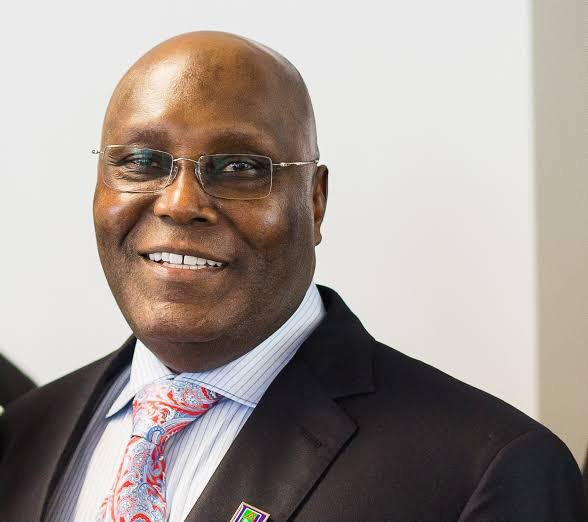News
Herdsmen Crisis: Why labelling attackers ‘Fulani’ is wrong — Atiku

Former Vice President Atiku Abubakar has frowned against the tribal profiling of violent criminals on rampage across central Nigeria.
The former vice president emphasised that people should be held responsible for their conducts as individuals and not on the basis of their ethnic affiliation.
“It is a misnomer to use the term ‘killer herdsmen of Fulani extraction’ or ‘killer Fulani herdsmen’,” Mr. Atiku told THISDAY in an interview.
Specifically, the paper asked the former vice president: “As a Fulani yourself, how do you feel about ongoing security crisis largely caused in many parts of the country by killer herdsmen of Fulani extraction? ”
After giving his response by listing a litany of issues, which included blaming leadership crisis, rising population and climate change, Mr. Atiku wrapped up by reminding his interviewer that the Fulani are a predominantly good tribe.
“The vast majority of Fulani people are peaceful and live in harmony with other ethnicities,” Mr. Atiku said.
“When kidnappers kidnap, we do not identify them by their ethnicity. We identify them as kidnappers, pure and simple.
“There may be fringe elements with criminal tendencies. Some may be Fulani. Some may not even be. Let us identify them by their activities and not by their ethnicity,” he added.
Mr. Atiku’s comments echoed the position of the Buhari administration on the reporting of herdsmen crisis.
In February, presidential spokesperson, Garba Shehu, slammed a section of the media for displaying an alarming “lack of respect for journalism ethics and press laws in the Nigerian media”
“We want to state emphatically that a segment of the Nigerian media is sinking deeper and deeper into the mesh of hate speech in spite of repeated appeals by recognised and reputable media bodies, the Government and concerned Nigerians,” Mr. Shehu said in a February 8 statement.
The interview comes amidst rising tension over attacks linked to herdsmen, especially across the north-central.
Dozens of deadly attacks carried out this year alone have left more than 500 people dead across the region.
While reported attacks are mostly against farming communities of other tribes, predominantly Fulani settlements have also come under deadly assaults.
Over the past week, dozens were killed in attacks on Fulani communities in Gembu and other communities around the Mambila plateau, Taraba State.
But social commentators are criticising the media for either underreporting attacks on the Fulani or reporting most attacks, including those against Fulani communities, as being carried out by ‘Fulani herdsmen.’
“Some journalists are guided by their ignorance of the ethnic terrain of northern Nigeria,” said Aliyu Tilde, a retired university lecturer in Bauchi, “The Nigerian media is dominated by southerners and they have little to no knowledge about the north.”
He traced the misconception and stereotypes that southerners hold against northerners to Nigeria’s post independent conflict when one of the country’s earliest coup plotters wrote a book.
“It started with Adewale Ademoyega’s book titled ‘Why We Struck,’ he used the book to paint the Fulani as bad even from the first chapters,” Mr. Tilde said.
“The media in the south jumped on that book and have passed its inaccurate content to new generations,” he added.
Mr. Tilde, now a farmer, said journalists must first understand the dimensions of the frequent killings in the north before filing reports.
“There are at least three key dimensions to the crisis. First is the farmers-herders clashes which are usually due to encroachment on farmlands.
” The second is tribal where you have some tribes wanting to be left alone to dominate their own region forever.
“The third involves criminal elements who are exploiting the porous security situation to perpetrate attacks. Sometimes, the attackers are Fulani. But definitely not always,” he said.
Mr. Tilde said the media could help reduce violent clashes, especially those with ethnic or religious undertone, if reports are disseminated to the public with professionalism.
He cited an early February incidence in which about eight Fulani travelers were burnt in Gboko, Benue State, saying the media downplayed the attack by initially withholding the identities of the victims.
-
Society News4 years ago
Jamaican man beheads wife after finding out their 6 kids are not his
-
Society News6 years ago
EXCLUSIVE: The Complete Story of Dolapo Awosika, John Fashanu and Prophet Kasali Sex Mess
-
News4 years ago
Pastor Osagie Ize-Iyamu, His Membership Of Secret Cult, And Other Issues Touching On His Public Credentials Examined by Barr. PATRICK I. BIOSE
-
News4 years ago
BREAKING: Ajimobi’s daughter-in-law blast Gov. Makinde, says gov can’t surpass ex-Oyo gov
-
News4 years ago
BREAKING: 2 arrested as NAF begins investigations into Tolulope’s death
-
Crime5 years ago
Exclusive: Female Aide Fingered In Oko Oloyun’s Murder + Banking Transactions That Nailed Husband
-
News4 years ago
BREAKING: Police take over Edo House of Assembly as APC, Oshiomhole move to seize control
-
Society News5 years ago
The Rise and Fall of “Jumoke The Bread Seller”
You must be logged in to post a comment Login